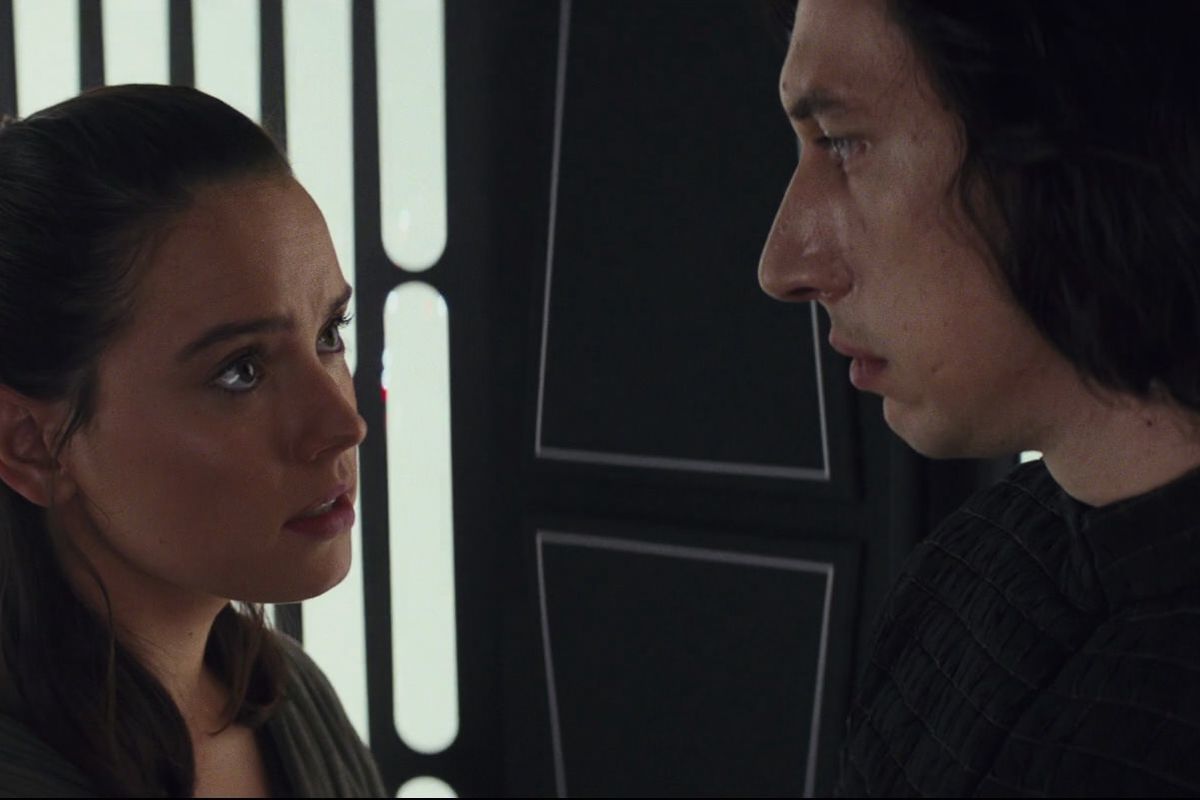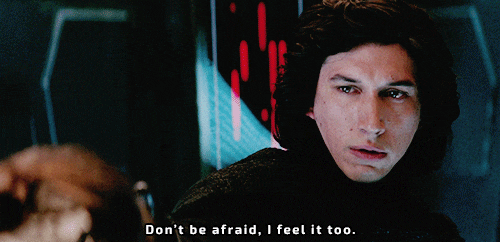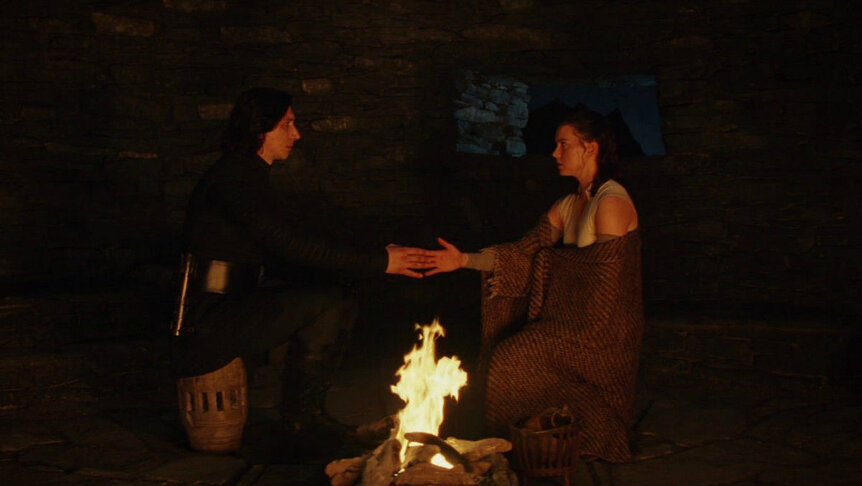Create a free profile to get unlimited access to exclusive videos, sweepstakes, and more!
Following The Rise of Skywalker, what is there left to say about Reylo?

After nine movies, 41 years, and billions of dollars, Star Wars brought the Skywalker Saga to an end this month. Well, at least we think they did. This franchise has ended and revived itself more times than anyone thought possible, so who knows what the future holds for it. As it stands, however, Episode IX: The Rise of Skywalker is ostensibly the ultimate conclusion to a story that has gripped fans for decades. A new generation of fans and creators were given the keys to the kingdom in the hopes of expanding the narrative above and beyond the initial trilogy’s ragtag crew. Brought into the fold were filmmakers J.J. Abrams and Rian Johnson, and new characters like Finn, Poe Dameron, Rose Tico, Vice Admiral Holdo, and, of course, Rey and Ben Solo, aka Kylo Ren.
It’s the latter two characters who, for many fans, proved to be the most enthralling aspect of this trilogy. In a fandom chock-full of shipping options, there was just something about Reylo that captured the imagination in a way that felt part of Star Wars past, present, and future. Part epic romance, part ultimate battle of good versus evil, the Reylo arc couldn’t help but prove as alluring to some fans as it was controversial to others. The possibility of Reylo endgame seemed tentative in The Force Awakens but a near-inevitability by The Last Jedi. So, how would The Rise of Skywalker resolve this?
Warning: Spoilers for The Rise of Skywalker below. Read on at your own risk.
After finally rejecting the dark side, Ben Solo cast off the name Kylo Ren and rushed to Rey’s help as she came close to giving in to Emperor Palpatine (revealed to be her grandfather) and his demands that she take his place and rule the Sith. The pair were ready to fight together against the biggest evil in the galaxy, but it was Rey who cast the killing blow, leaving herself dead. Ben, echoing a good deed Rey had performed for him earlier, shared his life force with her to revive her. After one passionate kiss, he died and Rey was left alone, adopting the name Skywalker and gazing at the moons of Tatooine.
Suffice to say, Reylo fans have by and large not been wild about this conclusion. Lindsey Romain, an editor at Nerdist and co-host of the podcast Heylo Reylo, noted how the fandom was feeling in the aftermath of the film: "There's been a lot of outrage from what I've seen. I follow several stan accounts because of my podcast and they have mostly been in mourning. I think a lot of that has to do with Ben's death. It's also rooted in this weird sexism that we see a lot from male creators, where a woman expresses a desire for romantic love but it has to be tragic and they have to be alone at the end to be 'strong.' As someone into Reylo, it felt worse that they even acknowledge their mutual feelings at all if it was just going to end up that way. Punishing the heroine by killing her soulmate, etc [...] The whole movie felt like an attempt to please several different camps at once but in a really unsatisfying way."
For Twitter user Laura, there was something unexpectedly tough about this ending that felt unfair and unsatisfying as a fan and shipper: "Their ends are so bleak. Ben, having never know true light, has finally found one in Rey, his ray of light. And he gets to enjoy that for mere seconds before he dies. And Rey... She ends up alone on a desert planet, just like the beginning of the series. All this searching, all these battles (physical and emotional) and for what? She’s still alone... I guess you can say it wasn't about shipping them together as a couple necessarily. It was about the fact that the whole series pointed to them as being the place where they would find the happiness and belonging they searched for. The whole series alluded to that! And then it didn't deliver. There's some way to twist the ending and make it 'hopeful' but I haven't achieved that yet."
The biggest problem with The Rise of Skywalker is one that is distinctly Abrams-esque: The fetishizing of nostalgia in the name of pandering to fans that ultimately ends up appealing to nobody. So much of the film’s faults lie in the narrative’s desperation to tie up loose ends nobody really cared about and to root the more dramatic and risky elements of The Last Jedi in the calming salve of the familiar past. Rey no longer gets to be a nobody who proves that heroism belongs to everyone. Rose Tico’s message of radical love in the face of hopelessness is maligned and so is she, along with the connection she forged with Finn. Any hint of there being something beyond friendship with Finn and Poe, something both actors cheered for, is given a quick “no homo” as both characters are shoved into new romances with just-added female characters, which in turn reduced their own importance to the story to view them simply as love interests. And then there was Reylo. Have your cake and eat it — or rather, look at the cake being tossed aside but enjoy the crumbs left on the table.
For some fans, like Julia Ofman, it was the lack of real emotional build-up between the pair that sank their story:
"Every time they're on screen together, except the very end, they're fighting one another. When he finally comes to her aid, redeemed and in all his Solo bravado glory, the ONLY WORD he says is 'ouch.' They never talk, they don't cry out over the other's dead body. When Ben died, our theater laughed. That's how little emotional buildup there was, that's how sudden and strange it was. Then we don't see Rey mourn like, at all? It was infuriating."
The arc of Ben and Rey always held thematic parallels to Luke’s relationship with his father in the original trilogy, but you can’t wholly replicate that dynamic with a romantic slant instead of a familial one. The mutual pull between the light and dark side that they found themselves on opposing sides of carried a heftier symbolism when tied to the age-old romantic symbolism it entailed. The Last Jedi in particular heavily played up the idea that Ben and Rey are two halves of the same whole, one perfect unit of power and empathy who fight side by side in perfect harmony. Their battle together in Snoke’s throne room features some of the best visual storytelling in the entire series. This is where you see them together in their prime, showing a mere sliver of the potential they possess as a unit. They don’t even have to think about it because it comes so naturally.
The film explicitly plays their relationship as one of tension, be it the pull of power or the thrall of romance. Some moments play like a rom-com, such as shirtless Kylo clearly flexing for Rey and her being embarrassed by it. The Last Jedi set up so much in regard to Reylo that The Rise of Skywalker didn’t seem to want to deal with. It wanted to play more with the family dynamics established with Luke and Vader but felt the need to toss in an obligatory kiss to please the shippers as if all they wanted was a kiss.
This is a story that could have worked and still end with Ben dying. It didn’t have to be happy Reylo ever after, skipping off into the dual sunsets of Tatooine. It doesn’t work in The Rise of Skywalker because all the noise around it neuters that crucial emotional hook and punctures the exciting and crucial narratives of two characters who deserved better. The wider implications for the galaxy at large are left hanging by this lazy conclusion too. Is the balance of the Force restored now that Ben is dead, even though he didn’t die a Sith? What about the young boy at the end of The Last Jedi who used the Force and symbolized that anyone could be a hero? Does he matter now, or does he not have the right lineage for the story to care? Does Ben get to be a Force ghost? Too many questions are left unanswered, especially for a movie that seemed determined to plug gaps left, right, and center.
The Rise of Skywalker is not a disappointing film simply because of the way it treats Ben and Rey’s story. Rather, the attempt to have it both ways with little consideration for the wider narrative and demands of the story exemplifies the many weaknesses of this long-awaited conclusion to a beloved story. It’s a reminder that nostalgia as the primary, if not exclusive, driver of storytelling and the entertainment complex at large can only take us so far. The Rise of Skywalker seems driven by the belief that if it gives the fans enough references to the past then they won’t be so concerned about the future. Indeed, it seemed to believe that the thing fans wanted was for everything established in The Last Jedi to be tossed aside as if it didn’t matter, be it Rose or Luke’s guilt or Rey’s parentage or the connection she has forged with Ben, one where he is, visually and thematically, defined as a romantic hero.
It’s not just about Reylo: It’s about how the Star Wars franchise as it stands seems so afraid of change that it would rather hide on an island like Luke Skywalker and avoid the future for all its worth. Nostalgia has paid off handsomely for this franchise, but that strategy cannot last and it won’t if the films continue to essentially chicken out or backpedal on more radical aspects of its storytelling, like Reylo. They say those who do not know their past are doomed to repeat it, but there’s little instruction for those who won’t forget it and insist on that endless cycle. Perhaps The Last Jedi put it best: Let the past die. Kill it if you have to.
















